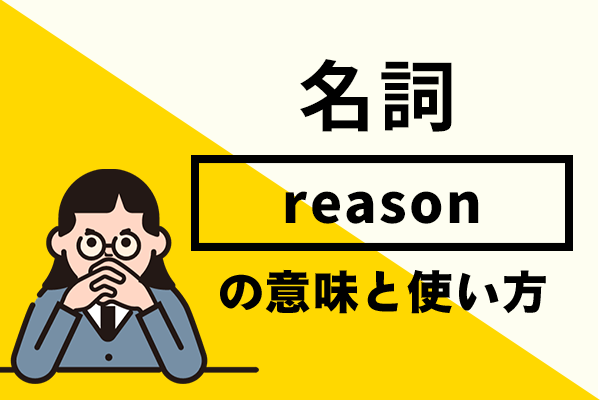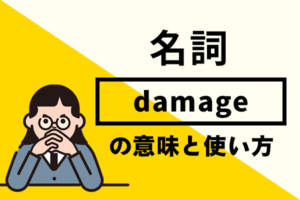reasonは「理由」という意味で最も一般的に使われる名詞ですが、causeやexcuseとの違い、前置詞や接続詞との使い分けを正確に理解することが重要です。
特にreason for/reason why、the reason is that/becauseなどの文法的使い分けは、TOEICや英検でもよく問われるポイントです。
この記事では、reasonの正確な意味、causeやexcuseとの違い、reason for/reason whyの使い分け、the reason is that構文、for some reason・for no reasonなどの慣用表現、ビジネスでの使い方まで、初心者にも分かりやすく解説します。
例文やコロケーション、練習問題を通して、日常会話からフォーマルな場面まで使える表現を身につけましょう。
reasonのコアイメージ
reasonの語源はラテン語の「ratio(計算、理性、理由)」で、論理的思考と関連しています。
コアイメージは「考えて出した結論 → なぜそうするのかという理由、判断の根拠」です。
単なる原因ではなく、人間の意図や判断に基づく「理由」を表します。
「なぜそうしたのか」「なぜそう考えるのか」という主観的な説明を示すニュアンスがあります。
reasonの基本情報
| 項目 | 内容 |
|---|---|
| 単語 | reason |
| 発音 | /ˈriːzn/(リーズン) |
| 品詞 | 名詞(可算名詞・不可算名詞両方) |
| 語源 | ラテン語 ratio(計算、理性、理由) |
| TOEIC頻出度 | ★★★★★ |
| 意味 | 用法 |
|---|---|
| 理由、根拠 | 可算名詞(a reason / reasons) |
| 理性、分別 | 不可算名詞(reason) |
| 道理、正当性 | 不可算名詞(reason) |
※reasonは「理由」の意味では可算名詞で、a reason、the reason、reasonsのように使います。
「理性・分別」の意味では不可算名詞として使われます。
発音・アクセントの注意
reasonの発音は /ˈriːzn/(リーズン)で、第1音節の「rea」にアクセントがあります。
日本語の「リーズン」とほぼ同じですが、正確な発音を理解することが重要です。
発音のポイント:
✅ 第1音節を強く:REA-son
✅ 第1音節の母音は /iː/ で「イー」と長く
✅ 語尾の -son は /zn/ で「ズン」
✅ 語尾の -a- は発音せず、/ˈriːzn/ となる
似た発音の単語との違い:
reason:/ˈriːzn/(リーズン)- 「イー」と長く
raisin:/ˈreɪzn/(レイズン)- 「エイ」の二重母音
season:/ˈsiːzn/(シーズン)- 頭の子音が異なる
reasonとseasonは発音が似ていますが、頭の子音(r と s)で区別します。
reasonの意味とニュアンス
reasonは主に3つの意味で使われますが、いずれも「論理的思考」というコアイメージでつながっています。
理由、根拠(行動や判断の)
最も基本的な意味で、なぜそうするのか、なぜそう考えるのかという理由を表します。
人の意図や判断の背景を示す際に使われます。
What’s the reason for your decision?
あなたの決定の理由は何ですか?
I have my reasons.
私には私なりの理由がある。
The reason I called is to ask for help.
電話した理由は助けを求めるためです。
理性、分別(判断力)
冷静に考える能力や論理的思考力を表します。
感情に対比される理性的な判断を示す際に使われます。
Use your reason, not your emotion.
感情ではなく理性を使いなさい。
He lost all reason when he heard the news.
彼はそのニュースを聞いて完全に理性を失った。
Let reason prevail over passion.
情熱より理性を優先させなさい。
道理、正当性
物事の正しさや妥当性を表します。
論理的に正しいことや常識的判断を示します。
There’s no reason in his argument.
彼の主張には道理がない。
That stands to reason.
それは当然のことだ。
It’s against all reason.
それはすべての道理に反している。
reasonの使い方
the reason for + 名詞(〜の理由)
最も基本的な使い方で、名詞が理由の対象になります。
行動、決定、状況などの理由を説明する際の標準的な表現です。
What’s the reason for the delay?
遅延の理由は何ですか?
The reason for my absence was illness.
私が欠席した理由は病気でした。
Tell me the reason for your choice.
あなたの選択の理由を教えてください。
There must be a reason for his behavior.
彼の行動には理由があるはずだ。
the reason why + 節(〜する理由)
完全な文(主語+動詞)で理由を説明する構文です。
「なぜ〜なのか」という疑問に答える形です。
That’s the reason why I left.
それが私が去った理由です。
Do you know the reason why she quit?
彼女が辞めた理由を知っていますか?
The reason why prices are rising is inflation.
価格が上昇している理由はインフレです。
I don’t understand the reason why he did that.
彼がそれをした理由が理解できない。
※口語では why を省略して “the reason I left” と言うこともあります。
the reason (that) + 節(〜という理由)
that節で理由の内容を説明する構文です。
thatは省略されることも多いです。
The reason (that) I’m late is traffic.
私が遅れた理由は交通渋滞です。
The reason we’re here is to celebrate.
私たちがここにいる理由は祝うためです。
The reason he succeeded is hard work.
彼が成功した理由は努力です。
The reason is that + 節(理由は〜だ)
理由を説明する際の定型表現です。
“The reason is because” は文法的に誤りとされることが多いです。
The reason is that I was busy.
理由は忙しかったからです。
The reason is that we need more time.
理由はもっと時間が必要だからです。
The reason is that he wasn’t qualified.
理由は彼に資格がなかったからです。
※”The reason is because” は避けるべきで、”The reason is that” または単に “because” を使います。
for some reason(なぜか、何らかの理由で)
理由が明確でない、または言いたくない場合の表現です。
日常会話で非常によく使われます。
For some reason, he didn’t come.
なぜか彼は来なかった。
The computer stopped working for some reason.
コンピューターが何らかの理由で動かなくなった。
For some reason, I feel tired today.
なぜか今日は疲れている。
reasonの慣用表現
for no reason(理由もなく、無理由で)
正当な理由がないことを表す一般的な表現です。
不合理さや不公平さを示す際に使われます。
He got angry for no reason.
彼は理由もなく怒った。
She was punished for no reason.
彼女は理由もなく罰せられた。
The meeting was cancelled for no reason.
会議は理由もなくキャンセルされた。
for this/that reason(このため、その理由で)
前述の理由を受けて結論を述べる表現です。
論理的な説明の際に便利な接続表現です。
The project is expensive. For this reason, we need more funding.
プロジェクトは高額だ。このため、もっと資金が必要だ。
For that reason, I decided to quit.
その理由で、私は辞めることにした。
He was late. For this reason, he missed the meeting.
彼は遅刻した。このため、会議に出られなかった。
stands to reason(当然である、理にかなっている)
論理的に当然のことを表す慣用表現です。
フォーマルな文脈で使われます。
It stands to reason that prices will rise.
価格が上昇するのは当然だ。
It stands to reason that he would be upset.
彼が動揺するのは当然のことだ。
If demand increases, it stands to reason that supply must too.
需要が増えれば、供給も増えるのが当然だ。
reasonのコロケーション
| コロケーション | 意味 | 例文 |
|---|---|---|
| main reason | 主な理由 | The main reason was cost. |
| good reason | 正当な理由 | There’s a good reason for that. |
| valid reason | 妥当な理由 | You need a valid reason. |
| real reason | 本当の理由 | What’s the real reason? |
| obvious reason | 明白な理由 | For obvious reasons, we declined. |
| personal reason | 個人的な理由 | He left for personal reasons. |
| for some reason | なぜか | For some reason, it didn’t work. |
| for no reason | 理由もなく | He left for no reason. |
| give a reason | 理由を述べる | Please give me a reason. |
| explain the reason | 理由を説明する | Can you explain the reason? |
reasonは理由の性質を表す形容詞(main/good/valid/real)や、理由を説明する動詞(give/explain)とよく組み合わせて使われます。
reasonを使った例文(シーン別)
試験でよく出る例文
The reason for his absence was illness.
彼が欠席した理由は病気だった。
What is the reason why she quit?
彼女が辞めた理由は何ですか?
The reason I’m calling is to confirm the meeting.
電話している理由は会議を確認するためです。
There are several reasons for the delay.
遅延にはいくつかの理由がある。
The reason is that we need more data.
理由はもっとデータが必要だからです。
For some reason, the system crashed.
なぜかシステムがクラッシュした。
日常会話で使う例文
What’s the reason?
理由は何?
I have my reasons.
私には私なりの理由がある。
For no reason, he just left.
理由もなく、彼はただ去った。
That’s the reason why I’m here.
それが私がここにいる理由だ。
For some reason, I can’t sleep.
なぜか眠れない。
There must be a reason.
理由があるはずだ。
ビジネス文書・メールで使う例文
The reason for the delay is supply chain issues.
遅延の理由はサプライチェーンの問題です。
Please provide the reason for your request.
リクエストの理由を提供してください。
The main reason we chose this vendor is reliability.
このベンダーを選んだ主な理由は信頼性です。
For this reason, we recommend proceeding with caution.
この理由で、慎重に進めることをお勧めします。
The reason for the price increase is rising costs.
価格上昇の理由はコストの増加です。
We need a valid reason to extend the deadline.
締め切りを延長するには妥当な理由が必要です。
reasonの類義語・関連語
| 単語 | 品詞 | ニュアンス・解説 |
|---|---|---|
| cause | 名詞 | 原因(客観的・物理的) |
| motive | 名詞 | 動機(特に犯罪の) |
| excuse | 名詞 | 言い訳、口実 |
| ground | 名詞 | 根拠(複数形で使用) |
| basis | 名詞 | 根拠、基礎 |
| justification | 名詞 | 正当化、弁明 |
「reason」と似た意味を持つcauseの意味と使い方や、動機を表すmotiveの意味と使い方も合わせてチェックすると理解が深まります。
混同されやすい語との違い
reason vs cause
reasonとcauseはどちらも「理由・原因」という意味ですが、使い方とニュアンスが大きく異なります。
reason: 主観的な理由、人の意図や判断
「なぜそうしたのか」という人間の行動の理由を説明します。
cause: 客観的な原因、物理的・科学的因果関係
「何が起こしたのか」という出来事の原因を説明します。
The reason I left was personal.
私が去った理由は個人的なことだった。
→ 個人の判断・意図
The cause of the fire was an electrical fault.
火災の原因は電気の故障だった。
→ 物理的な原因
What’s your reason for choosing this career?
このキャリアを選んだ理由は何ですか?
→ 個人の選択の理由
Smoking is a cause of lung cancer.
喫煙は肺がんの原因だ。
→ 医学的・科学的原因
簡単に言うと、reasonは人の行動の「理由」、causeは出来事の「原因」です。
reason vs excuse
excuseは言い訳や口実を表し、reasonよりもネガティブなニュアンスがあります。
reason: 正当な理由、説明
中立的で、妥当な説明を示します。
excuse: 言い訳、口実
責任を逃れるための弁解というニュアンスがあります。
He had a good reason for being late.
彼には遅刻した正当な理由があった。
→ 妥当な説明
That’s just an excuse.
それは単なる言い訳だ。
→ 責任逃れの口実
Give me one good reason.
一つ正当な理由を言ってみて。
→ 納得できる説明を求める
Stop making excuses!
言い訳はやめて!
→ 弁解を拒否
reasonは中立的、excuseはネガティブという違いがあります。
試験・ビジネス頻出度
reasonは英語の最も基本的で重要な単語の一つで、試験とビジネスシーンの両方で極めて高い頻出度を誇ります。
TOEIC
頻出度:★★★★★(超頻出)
TOEICではすべてのパートで頻繁に登場し、特にPart 5(文法問題)での前置詞や接続詞の使い分けが問われます。
以下のポイントが試験でよく問われます。
✅ reason for(名詞)とreason why(節)の使い分け
✅ The reason is that(正)vs The reason is because(誤)
✅ for some reason / for no reasonの慣用表現
✅ main reason / good reasonなどのコロケーション
典型的な出題パターン:
The reason ______ the delay has not been explained.
(A) for (B) of (C) to (D) why
正解:(A) for
解説:the delayは名詞なので、reason forが正解です。
英検
5級以上:必須単語
英検では5級から登場し、すべての級で頻出する超基本単語です。
級が上がるにつれて、複雑な構文での使い方が重要になります。
The reason I study English is to communicate with people worldwide.
私が英語を勉強する理由は世界中の人々とコミュニケーションするためだ。
→ 準2級〜2級レベル
ビジネス英語
頻出度:★★★★★(必須レベル)
ビジネスシーンでreasonは以下の場面で日常的に使われます。
✅ 決定や判断の説明
✅ 遅延や問題の理由説明
✅ 提案や要求の根拠提示
✅ 変更や中止の理由通知
The reason for this change is to improve efficiency.
この変更の理由は効率を改善するためです。
Please provide the reason for your absence.
欠席の理由を提供してください。
The main reason we chose this approach is cost-effectiveness.
このアプローチを選んだ主な理由は費用対効果です。
ネイティブがよく使う自然な表現
日常会話での定番フレーズ
What’s the reason?(理由は何?)
理由を尋ねる最もシンプルで自然な表現です。
A: I can’t come tonight. B: What’s the reason?
A: 今夜は行けない。B: 理由は何?
A: He quit his job. B: Really? What’s the reason?
A: 彼は仕事を辞めた。B: 本当?理由は何?
For some reason…(なぜか…)
理由が不明な場合や、説明したくない場合の決まり文句です。
For some reason, I feel nervous today.
なぜか今日は緊張している。
For some reason, the email didn’t send.
なぜかメールが送信されなかった。
For some reason, he didn’t show up.
なぜか彼は現れなかった。
I have my reasons(私には私なりの理由がある)
理由を詳しく説明したくない時の自然な表現です。
A: Why won’t you go? B: I have my reasons.
A: なぜ行かないの?B: 私には私なりの理由がある。
I don’t want to explain, but I have my reasons.
説明したくないけど、私なりの理由がある。
慣用表現・イディオム
for no reason(理由もなく)
正当な理由がないことを強調する表現です。
He got angry for no reason.
彼は理由もなく怒った。
The system crashed for no reason.
システムが理由もなくクラッシュした。
Don’t worry for no reason.
理由もなく心配するな。
for this/that reason(このため、その理由で)
前述の理由を受けて結論を述べる接続表現です。
The project is behind schedule. For this reason, we need to work overtime.
プロジェクトは遅れている。このため、残業が必要だ。
He was unqualified. For that reason, we couldn’t hire him.
彼は資格がなかった。その理由で、採用できなかった。
within reason(常識の範囲内で)
妥当な範囲や限度を表す表現です。
You can order anything, within reason.
常識の範囲内なら何でも注文していいよ。
We’ll accommodate your requests, within reason.
常識の範囲内でご要望にお応えします。
Spending is acceptable, within reason.
常識の範囲内なら支出は認められる。
ビジネスでの自然な表現
the main reason(主な理由)
複数の理由の中で最も重要なものを示す表現です。
The main reason for our success is teamwork.
私たちの成功の主な理由はチームワークです。
Cost is the main reason we declined.
コストが私たちが断った主な理由です。
The main reason we’re here is to discuss strategy.
私たちがここにいる主な理由は戦略を議論するためです。
for personal reasons(個人的な理由で)
詳細を明かさずに理由を示す丁寧な表現です。
He resigned for personal reasons.
彼は個人的な理由で辞任した。
I need to leave early for personal reasons.
個人的な理由で早退する必要があります。
The meeting was cancelled for personal reasons.
会議は個人的な理由でキャンセルされました。
provide a reason(理由を提供する)
フォーマルなビジネス文書で使われる表現です。
Please provide a reason for your request.
リクエストの理由を提供してください。
You must provide a valid reason.
妥当な理由を提供しなければなりません。
学術・フォーマルな表現
stands to reason(当然である)
論理的に明白なことを表すフォーマルな慣用表現です。
It stands to reason that demand will increase.
需要が増えるのは当然だ。
It stands to reason that quality affects price.
品質が価格に影響するのは当然のことだ。
listen to reason(道理をわきまえる)
論理的な説得に従うことを表す表現です。
He won’t listen to reason.
彼は道理をわきまえない。
Please listen to reason and reconsider.
道理をわきまえて再考してください。
reasonのよくある間違い
reasonは特に前置詞や接続詞との組み合わせで間違えやすいポイントがあります。
間違い1:The reason is becauseを使う
❌ The reason is because I was busy.
✅ The reason is that I was busy.
または
✅ It’s because I was busy.
理由は忙しかったからです。
解説:”The reason is because”は冗長で文法的に誤りとされます。
“The reason is that”を使うか、単に”because”だけを使います。
間違い2:前置詞の誤用(reason to)
❌ What’s the reason to the delay?
✅ What’s the reason for the delay?
遅延の理由は何ですか?
解説:名詞の後ろはreason forを使います。
reason toは不定詞の前でのみ使えます(reason to believe など)。
間違い3:reason whyの後に名詞を置く
❌ The reason why the accident is unclear.
✅ The reason for the accident is unclear.
または
✅ The reason why the accident happened is unclear.
事故の理由は不明だ。
解説:reason whyの後には完全な節(主語+動詞)が必要です。
名詞の場合はreason forを使います。
間違い4:causeとの不適切な使い分け
△ The reason of the fire was electrical.(不自然)
✅ The cause of the fire was electrical.
火災の原因は電気的なものだった。
解説:物理的・客観的な原因にはcauseを使う方が適切です。
reasonは人の行動や判断の理由に使います。
間違い5:不可算名詞としての誤用
❌ There are many reason for this.
✅ There are many reasons for this.
これには多くの理由がある。
解説:「理由」の意味では可算名詞なので、複数形reasonsにします。
ただし「理性・分別」の意味では不可算名詞です。
reasonの理解度チェック
ここまで学んだ内容を練習問題で確認しましょう。
穴埋め問題(5問)
1. What’s the reason ______ your decision?
(あなたの決定の理由は何ですか)
2. The reason ______ I called is to confirm the meeting.
(電話した理由は会議を確認するためです)
3. ______ some reason, the system isn’t working.
(なぜかシステムが動いていない)
4. The reason is ______ we need more time.
(理由はもっと時間が必要だからです)
5. He left ______ no reason.
(彼は理由もなく去った)
選択肢問題(5問)
1. What is the reason ______ the delay?
(A) of (B) for (C) to (D) why
2. The reason I’m here ______ to help you.
(A) is (B) are (C) was (D) were
3. There are several ______ for the decision.
(A) reason (B) reasons (C) reasoning (D) reasonable
4. The reason ______ I was busy.
(A) is because (B) because (C) is that (D) that because
5. He quit for ______ reasons.
(A) person (B) personal (C) personally (D) personality
解答
穴埋め問題
1. for
2. why / that(thatは省略可)
3. For
4. that
5. for
選択肢問題
1. (B) for
解説:名詞the delayの前なのでreason for
2. (A) is
解説:主語がThe reason(単数)なのでis
3. (B) reasons
解説:several(いくつかの)があるので複数形reasons
4. (C) is that
解説:The reason is thatが正しい形、is becauseは誤り
5. (B) personal
解説:personal reasons(個人的な理由)という慣用表現
reasonのコーパス実例
実際の英文メディアや会話でreasonがどのように使われているか見てみましょう。
新聞記事:The New York Times
“The main reason for the policy change, officials said, is to address growing concerns about climate change and its impact on future generations.”
「政策変更の主な理由は、気候変動とそれが将来世代に与える影響についての懸念の高まりに対処することだと、当局者は述べた」
解説:ニュース記事では、the main reason forが政策や決定の理由を説明する標準的な表現として使われます。
フォーマルで客観的な説明に適しています。
日常会話:映画のセリフ
“A: Why did you do it? B: I have my reasons. A: That’s not good enough! B: Well, it’s all you’re going to get.”
「A: なぜそんなことをしたの? B: 私には私なりの理由がある。A: それじゃ不十分よ! B: まあ、それが私が言えることのすべてだ」
解説:日常会話では、”I have my reasons”が理由を詳しく説明したくない時の自然な表現として使われます。
やや防衛的なニュアンスがあります。
ビジネススピーチ:企業発表
“The reason we’re investing in this technology is simple: it represents the future of our industry and positions us for long-term growth.”
「私たちがこの技術に投資している理由はシンプルです。それは業界の未来を表しており、長期的成長に向けて私たちを位置づけるからです」
解説:ビジネスプレゼンテーションでは、”The reason is…”が戦略的決定を説明する際の定番フレーズとして使われます。
明確で説得力のある説明に適しています。
reasonに関するよくある質問
まとめ
- コアイメージは「考えて出した結論 → なぜそうするのかという理由、判断の根拠」
- 主な意味は「理由・根拠」「理性・分別」「道理・正当性」の3つ
- reasonは主観的な理由、causeは客観的な原因、excuseは言い訳
- reason forは名詞の前、reason whyは節の前に使う
- The reason is thatが正しく、The reason is becauseは誤り
- for some reason(なぜか)、for no reason(理由もなく)は頻出慣用表現
- 「理由」の意味では可算名詞、「理性」の意味では不可算名詞
この記事の例文や練習問題を繰り返し復習すると、reasonの使い方が自然に身につきます。
英単語を効率よく覚えられるおすすめ本
英語学習の基本は、まず語彙力をしっかり身につけること。
ここでは、効率よく英単語を覚えて、長く使える力に変えていけるおすすめの本をご紹介します。














